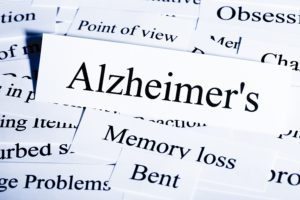Call Us Now1-800-414-2174


The Dreaded Disease – Alzheimer’s
As the baby boomers age, more and more people are eager to learn what they can do to slow the aging process and of course, keep the mind functioning clearly. Of course, it is no surprise that we are hearing a lot more about Alzheimer’s Disease (AD) these days as the population ages. AD is one of the most dreaded age-related diseases in the world. Studies have shown that it may be related to chronic inflammation and poor telomere maintenance.
AD is the most common form of dementia and is the 6th leading cause of death in the United States. Those with AD live an average of 8 years after their symptoms become noticeable to others, but survival can range from 4 to 20 years, depending on age and other health conditions. In its early stages, memory loss is mild, but with late-stage AD, individuals lose the ability to carry on a conversation and respond to their environment.
AD is obviously a life-changing illness, and one of the few that arguably can have an impact not just on the one directly afflicted by it, but by their entire family as well. AD is a disease that normally affects older people (65+); however, doctors are unsure why this is and why it happens with some people and not to others, especially because the disease is not a normal part of aging.
Inflammation, Stress, and Telomere Damage
Inflammation and chronic stress (psychological stress) has been associated with accelerated cell aging and AD via damage to telomeres at the ends of chromosomes (Puterman et. Al., 2010). Telomeres in most human cells shorten with each round of DNA replication, because they lack the enzyme telomerase. Oxidative damage is repaired less well in telomeric DNA than elsewhere in the chromosome, and oxidative stress accelerates telomere loss, whereas antioxidants decelerate it. Therefore, inflammation from oxidative stress is considered an important modulator of telomere loss that can accelerate aging of the brain and increase the risk of dementia.
Research supports that the better our telomeres are protected, the less chance we have of getting any of the big diseases. A study came out recently showing that when telomeres are better maintained, the chances of being a victim of Alzheimer’s disease is lowered.
How Can We Reduce inflammation and Telomere Damage?
It may come as no surprise that research finds that better nutrition, increased physical activity (exercise), and stress reduction (e.g. meditation) have been shown to reduce inflammation in the body and improve telomere maintenance. Daily exercise and proper nutrition have been correlated to so many health benefits that it actually seems too obvious to even mention them anymore. But nonetheless, both stand out as two of the most important things to do to improve and prolong the quality of life.
Cutting down on sugar, which increases inflammation in the body, and eating more nutritious foods that balance diets incorporating raw fruits, vegetables, whole grains, lean meats and nuts may not be surprising recommendations. However, here are a few recommendations emerging from research that still may surprise you.
For example, let’s look at mushrooms. Authors of a study published in the January edition of the Journal of Medicinal Food, identified mushrooms as a “functional food” that contain certain compounds that may ward off dementia and Alzheimer’s disease by boosting the production of a chemical called nerve growth factor (NGF) which protects against inflammation. Other foods that are have notable anti-inflammatory health benefits to fight off the aging process include beets, cherries, chia seeds, avocados and sauerkraut.
How about coffee? Coffee drinkers will be glad to hear that Stanford University School of Medicine researchers have discovered that drinking coffee may help protect older people against inflammation. The scientists, who published their findings in the journal Nature Medicine, found that older people whose bodies had low levels of inflammation shared another common characteristic — caffeine consumption. The results may help explain why coffee drinkers tend to live longer than those who avoid the beverage, according to a Stanford press release.
Dr. Furman and his colleagues at Stanford University analyzed blood samples from a group of healthy people between the ages of 20 and 30 and a second group 60 and older. They found that in the older subjects, two clusters of genes related to inflammation become more active, which in turn makes the people more vulnerable to the diseases. The researchers found caffeine apparently interferes with the pathway by which those genes trigger inflammation. People who drank five cups of coffee daily — an amount that some might consider excessive — showed extremely low levels of inflammatory gene activity.
Summary
Scientists certainly do not want to turn off inflammation in the body completely, since it also performs some very valuable functions, including helping the immune system fight infections. But they do hope to educate us about ways to help keep the inflammatory process in balance with age so that the aging process will not be accelerated.
So in summary, try to exercise more, eat healthier, meditate and reduce your stress. Oh, and one more thing- have another cup of coffee!
References:
The Power of Exercise: Buffering the Effect of Chronic Stress on Telomere Length
Eli Puterman, Jue Lin, Elizabeth Blackburn, Aoife O’Donovan, Nancy Adler, Elissa Epel, Annals of the New York Academy of Sciences, May 26, 2010
Can Meditation Slow Rate of Cellular Aging? Cognitive Stress, Mindfulness, and Telomeres
Elissa Epel, Jennifer Daubenmier, Judith Tedlie Moskowitz, Susan Folkman, Elizabeth Blackburn, Annals of the New York Academy of Sciences, August 28, 2009
WorkSaver Employee Testing Systems 478 Corporate Dr. Houma, LA 70360
![]()